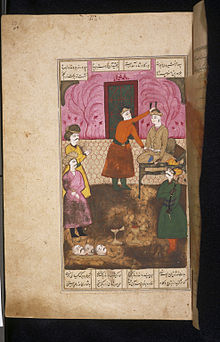Manutschehr (Shāhnāme)
Manutschehr , also Manutscher ( Persian منوچهر, DMG Manūčehr , older Persian Manōčihr ), is a figure of Persian mythology . He is the first king of the heroic age and is described in the seventh book of Shāhnāme , the "book of kings" by the Persian poet Firdausi (940 / 41-1020). The Avestan archetype is Manuščiθra . Rückert transliterated Minotschihr.
Manutschehr in Schahname - Legend VII
Manutschehr is the son of Iradsch and grandson of Shah Fereydun . Fereydun had divided his empire among his three sons Iradsch , Tur and Selm . However, Selm and Tur were dissatisfied that the youngest of the brothers should inherit the heart of the empire, Iran. After an argument with Iradsch, the brothers killed him. Thereupon Fereydun named Manutschehr as his successor. The succession to the throne of Manutschehr is contested by the two brothers Iradschs Tur and Selm . But Manutschehr succeeds in killing his father's two brothers and asserting himself on the throne as Fereydun's successor and ruler of Iran .
Sage VII, which is dedicated to the reign of Manutschehr, is one of the great sagas of Shahname with more than 100 pages. It begins with the story of the birth of Zāl , the son of Sām , an Iranian prince and (as a general) Pehlewan under Manutschehr's orders. Ferdosi later reports on the birth and growing up of Rostam , the son of Zal and Rudabeh , who becomes the Iranian national hero. At the end of the legend, Manutschehr chose his son Nowzar as his successor on the throne. He advises his son to seek help from Sam, Zal and Rostam in an emergency.
In Sage VII, Ferdosi no longer puts the Shah at the center of his story, but the heroes of Iran, who with Rostam are finally assigned a prominent position. At the end of his life, in the face of his death, he had Shah Manutschehr say:
“This Shahthrone is foam and wind,
Your heart will never be bound to it!
I made it a hundred and twenty years,
which were full of work and toil.
...
I clear the world of adversity, I build
many cities a hundredfold.
Now it's as if I've never seen the world,
And what I've done is as undone;
A tree of fruits and leaves tart;
It is not worth living to die. "
literature
- Friedrich Rückert : Firdosi's Book of Kings (Schahname) Sage I-XIII. 1890. Reprint: epubli GmbH, Berlin, 2010, pp. 136-239.
Individual evidence
- ↑ Friedrich Rückert: Firdosi's King Book (Schahname) Sage I-XIII. 1890, p. 234f.
| predecessor | Office | successor |
|---|---|---|
| Fereydūn |
King of Shāhnāme 1800–2300 after Gayomarth |
Nowzar |
